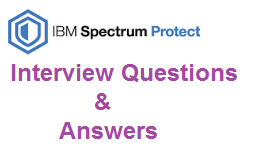These are the common and frequently asked IBM Spectrum Protect (TSM) interview questions. We have tried to provide some answers for the these questions. However, please add or modify the answers as per your understandings if required. If you need to learn IBM Spectrum Protect freely visit the page Tivoli Storage Manager Tutorials. You can also find the basic Video Tutorials at www.TSMtutorials.com Youtube channel.
Just as for any other interviews, Expect some basic questions about your education & work experience. Also be prepared for the questions related to your previous company and TSM infrastructure you worked upon. For example,
1) What are your Daily Acivities as TSM administrator ?
- Explain your previous company's Backup Setup ?
- Explain how Tape Library is configured ?
- What TDP products you worked on ?
1) What are your Daily Acivities as TSM administrator ?
- Health Check of all tsm servers which includes DB, LOG, STGPOOL Utilization, and Scratch count.
- Checking DB backup status, if it is not completed for the day then we will take Manual DB backup.
- Troubleshooting Missed/Failed Backpus based upon Priority.
- Decommioning & Registering Node if any needed.
- Checking status of admin schedules.
- Working on new restore request if required.
- Sending Daily status report to senior Managers on Daily Basis.
- Co-coordinating with Onsite people related to Library & tape Issues and for any change request.
- Installing and configuring any new TSM BAclients and TDP Clients.
2) What are the different types of TSM Licenses available ?
Tsmbasic.lic ----for basic version
Tsmee.lic-----for extended edition
Dataret.lic---for data retention version
3) How Database backup is configured in your previous organization ?
We Have a Admin Schedule Where It will take Full Backup of DB Once in a day.
DEF SCHEDULE DBBACKUP CMD=”BACKUP DB DEVC=LTO TYPE=FULL” PERIOD=1 DURATION=24 DURUNITS=HOURS ACTIVE=YES PRIORITY=1”
We also take DBsnapshot backup for DRM purposes.
We also take DBsnapshot backup for DRM purposes.
4) How to delete DB snapshot backups which are more than 1 week old ?
We can delete by using the command
Delete volhistory type=DBS begind=-7
Delete volhistory type=DBS begind=-7
5) How to check the status of backup schedules from last 5 days ?
q event * * begind=today-5 endd=today
To get the status of only failed/missed schedules
q event * * begind=today-5 endd=today ex=yes
To get the status of only failed/missed schedules
q event * * begind=today-5 endd=today ex=yes
6) How do you troubleshoot failed/missed backup schedules ?
We need to login to client system and check the dsmerror.log or dsmsched.log if any errors reported. Then based upon those errors, we need to fix the issues and rerun the backups upon client approval.
7) How to check if TSM scheduler service status ?
Run the below command to check the status
Run the below command to check the status
ps – ef | grep -i dsmsched
or
ps -ef | grep -i dsmcad
or
ps -ef | grep -i dsmcad
To start the services in UNIX Flavors
sudo /opt/tivoli/tsm/client/ba/bin64/dsmc sched > /dev/null 2>&1
sudo nohup dsmc schedule 2 > /dev/null &
sudo /opt/tivoli/tsm/client/ba/bin/dsmc sched -quiet &
sudo dsmc -optfile=/opt/tivoli/tsm/client/ba/bin/dsm.opt
8) What are the important Server & Client configuration files ?
dsmserv.opt, devconfig.out, volhist.out
DSMSERV.OPT: All the server configuration Information (Protocol detail, bufffersize, log pool size, Volhistpath, devconfig path)
DEVCONFIG.OUT: All device configuration information like device class, drives configuration info.
VOLHIST.OUT: All sequential volumes (LTO & FILE deviceclass) information.
Client configuration files are
DSM.OPT---- Client settings (Windows)
DSM.SYS & DSM.OPT ---- Client settings (UNIX)
DSM.SYS & DSM.OPT ---- Client settings (UNIX)
DSMSCHED.LOG----Scheduled Information will be there
DSMERR.LOG----Error related logs will be Displayed
9) What are the common backup failure problems on Windows servers
- Server out of data storage space
- System Object error1
- Snap shot operation failure
- TCP/IP error
- Microsoft Volume shadow copy failed
- Authentication failure
- Removing previous system state backup failed
- Communication with TSM server lost
- O.S refused memory allocation
10) What is reclamation ? How to know which tapes are eligible for reclamation ?
Reclamation is the process of moving the unexpired data from fragmented tapes to another tapes which are in filling tapes for the efficient use of the tape resources. If reclaim threshold limit is set as 60%, then tapes which are having status=FULL and pct_utilization<40 are eligible for reclamation.
11) What are the TSM schedule return codes ?
0---Operation completed successfully
4---Oeration completed successfully except with one or more skipped files
8---Operation completed with one or more warning message object
12--Operation failed with one or more error messages
12) How to understand the TSM Event messages shown in activity log ?
Generally, TSM event messages are in below format
ANR [R S E] ???? [I W E S]
R---Server
S---Client
E---Event
I Information
W Warning
E-Error
S Severe
13) How to check the TSM server installation status ?
Check the following log files for the status report
Windows------INITSERV.LOG
AIX------INSTALL.TRACE
14) What is the purpose of PASSWORDACCESS GENERATE ?
Tsm client password is encrypted and stores in a file on the client. If a client receives that password
has expired from the tsm server then client generates a new password.
password dir is a option in the b/a client to specify the location of the encrypted password file
But win32 systems are having exception that the encrypted password stores in the registry
15) What are the common backup failure problems on UNIX servers
1. File not found
2. Directory path not found
3. Invalid password
4. TCP/IP issue
5. Server out of data storage space
6. Incremental processing on file system stopped



0 Comment to "Spectrum Protect Basic Interview Question and Answers"
Post a Comment